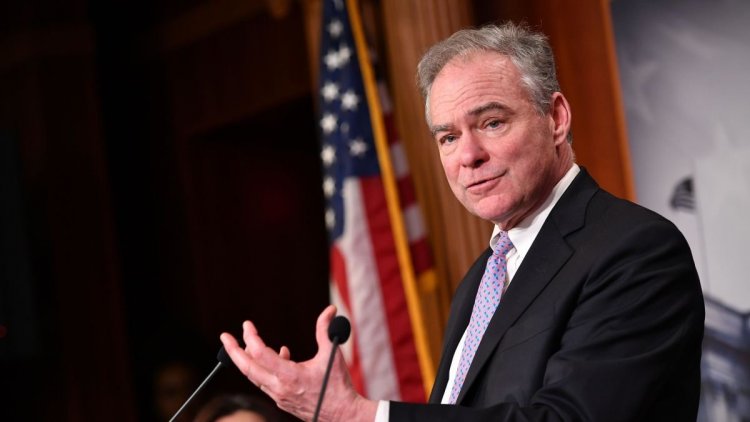Tim Kaine Net Worth, Family, Wife and Political Career
Tim Kaine is an American politician, lawyer, and member of the Democratic Party who has served as the U.S. Senator from Virginia since 2013. He was also Hillary Clinton’s running mate in the 2016 U.S. presidential election, where they lost to Donald Trump and Mike Pence.

Timothy Michael Kaine was born on February 26, 1958, in Saint Paul, Minnesota, USA. He grew up in Overland Park, Kansas, in a working-class Catholic family. His father, Albert Alexander Kaine Jr., was a welder and owned a small ironworking shop, while his mother, Kathleen Kaine, was a home economics teacher. Kaine attended Rockhurst High School, a Jesuit school in Kansas City, Missouri.
He later studied at the University of Missouri, earning a degree in economics in 1979. He then attended Harvard Law School, where he took a break to work as a missionary in Honduras, teaching carpentry and welding. This experience deeply influenced his views on social justice. He returned to Harvard and earned his law degree in 1983.
Tim Kaine Family & Wife
Tim Kaine is married to Anne Holton, an attorney and judge. She is the daughter of former Virginia Governor A. Linwood Holton Jr. They met at Harvard Law School and married in 1984. Anne Holton served as Virginia’s Secretary of Education and has been a strong advocate for children and education reform.They have three Children together.They have lived in Richmond, Virginia, for many years and are deeply involved in community and social work.
Tim Kaine Net Worth
As of 2025, Tim Kaine's estimated net worth is between $5 million and $10 million. His wealth comes from his legal career, political earnings, and investments. As a U.S. Senator, he earns an annual salary of $174,000.
Tim Kaine Political Career
Tim Kaine’s career has been defined by his dedication to public service and advocacy for civil rights. He started out as a civil rights attorney in Richmond, Virginia, fighting against housing discrimination and working to ensure fair opportunities for all. His passion for making a difference led him to public office in 1994, when he was elected to the Richmond City Council. Just four years later, he became Mayor of Richmond, where he focused on improving the city’s infrastructure and governance.
His leadership caught the attention of state leaders, and in 2002, he was elected as Virginia’s Lieutenant Governor, serving alongside Governor Mark Warner. By 2006, he was elected as Governor, where he prioritized education, healthcare, and economic growth. He also played a crucial role in steering Virginia through the 2008 financial crisis, making tough decisions to keep the state on stable footing.
After his time as governor, Kaine expanded his influence nationally by serving as Chairman of the Democratic National Committee (DNC) from 2009 to 2011. In this role, he worked to strengthen the party and support Democratic candidates across the country.
His leadership and experience led to his election as U.S. Senator from Virginia in 2012, and he was re-elected in 2018. As a senator, he has been a strong advocate for military families, affordable healthcare, and economic policies that support working-class Americans. He has also served on key Senate committees, focusing on foreign relations, national security, and budgeting.
In 2016, Kaine made national headlines when Hillary Clinton chose him as her running mate for the presidential election. He went head-to-head with Mike Pence in the vice presidential debate, but ultimately, the Democratic ticket lost to Donald Trump and Mike Pence. Despite the setback, Kaine has remained an active and influential voice in American politics, continuing his fight for policies that support families, veterans, and everyday Americans.f
